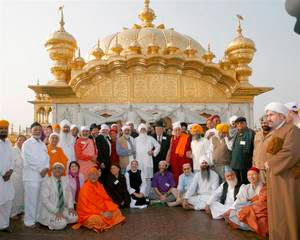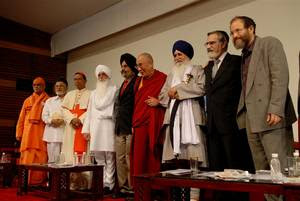 |
 |
 |
||||||
|
|
|
|
|
|
|
|
||
|
|
|
|||||||
|
|
||||||||
|
|
|
|
|
|
|
|
|
|

|
|||||||||||||||||||||||||||||||||||||||||
The Meeting was facilitated and prepared by the following Think Tank Members:
----------------------------------------------------------------------------------------------- NEWS UPDATE: Amritsar Participants Share their Experience
His Holiness the Dalai Lama, India: "This is the most intimate and most profound interfaith group in whose work I have been involved. Elijah is Unique." Rabbi Awraham Soetendorp, Holland: "In Elijah, the careful preparation by a panel of scholars of background papers, delving into the subject matter (in this latest case: Sharing Wisdom),summarising the results of dialogues in the past and adding a personal evaluation, all this paves the way for those who take up responsibility of religious leadership to listen and speak more with their heart. To take up a fresh approach, to achieve together a deeper understanding of the other and to strengthen mutual trust. Thus a spiritual event is engendered that allows for personal discovery, the search for new meaning, in a self-critical, yet unassuming, manner. Thus gradually a community of religious leadership forms itself." I see in Elijah the emergence of a true council of religious leaders that is able and granted to assume the so much needed role of moral leadership. ----------------------------------------------------------------------------------------------- NEWS UPDATE: Remembering Daniel W. Hardy Elijah mourns the passing away of Daniel W. Hardy of Cambridge University. Dan was a member of Elijah's academic advisory board and followed Elijah's development with care and passion since its establishment. Dan was an ordained Anglican Theologian, associated with the General Theological Seminary, University of Birmingham and the Princeton Center of Theological Inquiry, where he served as the director, and where I (Alon Goshen-Gottstein) first met him. Dan's interests in Wisdom and its relationship to love were closely related to Elijah's own emphasis on the wisdom of faith traditions. He was one of Elijah's wisest counselors and will be sorely missed. ------------------------------------------------------------------------------------------------ SHARING WISDOM: The Amritsar Declaration The following declaration captures the spirit of the Amritsar meeting. We would be grateful if you could help disseminate this declaration. Kindly consider posting it on your department's bulletin board, sharing it with your friends, your e-lists, etc. Please become our partner in sharing the fruits of our deliberations with others. Concluding Statement of the Board of World Religious Leaders A project of the Elijah Interfaith Academy Amritsar, Punjab, India 26-30 November 2007 We, the Board of World Religious Leaders, representing 6 of the World's great Religious Traditions, have just concluded our third biennial meeting. This gathering in Amritsar, the holy city of Sikhism, was characterized by a profound sense of openness, mutuality, respect for one another's faith, and trust. The sense of shared spiritual longing pervaded our deliberations our and our commitment to taking our learnings from our meeting to the larger world infused our discussions. There was both an intimacy to our discourse and expansiveness to our vision. Through this Declaration, we invite others to join with us in affirming the profound Wisdom of our religious traditions and how that wisdom can inform the world. Our meetings have not taken place in a vacuum. We are building on the insights of the previous meetings of the board and of the august Think Tank of scholars whose teachings guided our work. We have previously articulated the many and often overwhelming needs which we feel mandate our attention. In light of our earlier statements, we, the teachers of wisdom of religious traditions acknowledge that none of our traditions is exempt from the responsibility to address the crises of our time. Our Mandate Although there are no facile solutions to the ills of the world, we must reaffirm our commitment to do all we can to alleviate present suffering and to contribute to a solution of those problems that we can address. We wish to state our recognition that in the world's present state, all traditions have become interdependent, and must therefore face the challenges of the world in a collaborative manner. We wish to affirm our belief that within our traditions are resources of wisdom that can speak to the ills of society and the misuse of religion. We wish to call upon all our religions to offer their finest teachings as resources to guide humanity to safe harbor, and to identify the teachings they can jointly offer a suffering humanity. We wish to further call upon practitioners of all religions to become aware of the life wisdom and spiritual wisdom of all religious traditions, as a means of obtaining a truer understanding of other religions, in the service of peaceful living. We invite thinkers and religious leaders to explore the possibility of addressing their own internal crises in light of the experiences and accumulated wisdom of other religious traditions. Our Respect for Our Own and Other Traditions While we recognize the need of the hour points to opening towards the other, rather than to isolation, leading to violence and enmity, we call attention to the following considerations that are the basis of respectful learning and sharing between people, as individuals and as representatives of religious traditions · Sharing Wisdom should never lead to the violation of the integrity of religious identity. Sharing wisdom is not a means of influencing others to change or abandon their religious identity, either willfully or by coercion, but rather an invitation to deepen it and become more faithful to it. · Sharing Wisdom has a broad universal mandate, almost a human right, grounded in the dignity of the human being, as understood diversely by our religious traditions. It is closely related to the right of religious freedom. As a spiritual process, it should be broadly open, beyond considerations of gender, caste and other forms of limitation. · Sharing Wisdom should respect the integrity of religious teachings. It should not lead to the cheapening of teaching, nor to the loss of authenticity. Consequently, care must be taken to be mindful and respectful of broader theological structures, within which wisdom is couched, and to the internal processes, commitments and conditions that are necessary for successful realization of the age old wisdom of religious traditions. · Sharing Wisdom implies responsibility on the part of leaders. Our words and our actions should be accompanied by careful consideration of what forms of wisdom are most suitable to broad sharing with others, so that wisdom is always shared with value and integrity. Our Aspiration and Prayer It is our faith that the ills of the world and the abuses done in the name of religions may be addressed through an attitude of openness to sharing and learning from one another. In an increasingly interdependent world we are called to share our wisdom, to offer it to others, and to listen to what they in turn have to offer. It is our sincere hope and prayer that such sharing, carried out in the right spirit, will make our traditions better vehicles to achieve their designated purpose and will make the world a better and more peaceful place in which our religions and humanity can flourish. Phone: +972-2-672-9276 , Skype: adminelijah 10 Caspi Street 93554 Jerusalem Israel
|
Copyright ©2005 IRFWP. All rights reserved.
Home | Top of the Page



